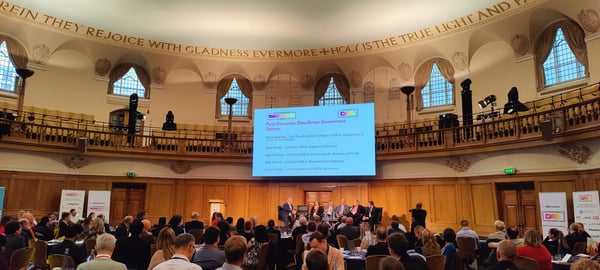Event Chair: merging digital, data strategies has never been more important
 More than 300 public sector specialists from the UK and beyond gathered at the Government Transformation Summit and Government Data Summit today to discuss some of the latest approaches to modernising the public sector.
More than 300 public sector specialists from the UK and beyond gathered at the Government Transformation Summit and Government Data Summit today to discuss some of the latest approaches to modernising the public sector.
Against a backdrop of industrial action and service delivery issues across the public sector, attendees gathered to discuss key issues in digital transformation and data, ranging from agency cross-collaboration and resourcing to the use of Artificial Intelligence (AI) and faster service delivery.
The one-day event spanning two key areas of government - Transformation and Data - featured keynote presentations by senior civil servants from across Whitehall, and partner jurisdictions including the US, Germany, Sweden, Spain, Poland and Estonia.
Held for the fourth year in a row, both events hosted panel discussions about data and technology strategies that are revolutionising government operations.
Transforming the way citizen services are delivered
Introducing the event, Government Transformation Magazine General Manager and chair for the day David Wilde explained that the co-location of both events spoke to the growing requirement for data and digital to combine for greater effect:
“The need for data and digital to work more closely together has never been more important. Developments such as AI and a thirst for better decision-making are driving the Civil Service agenda.”
The first keynote speech of the morning was given by Richard Corbridge, the new Director General Digital at the Department for Work and Pensions (DWP), having spent several years as Chief Information Officer at Boots & No.7 Beauty Company.
He told attendees that the level and pace of change in digital transformation at the DWP - which looks after 12 million of the most vulnerable people in the UK - is “huge”, with “giant leaps forward” made in the past three to four years alone.
“In retail, I learned that using data for personalise products and services was key,” he added. “The same needs to happen at the DWP. Personalising the offer for vulnerable individuals is our goal - and the biggest opportunity to change the way we look at each citizen.”
But he added: “Big organisations, whether in the public or the private sector, still struggle to understand how best to use data. We have so much information but not enough insight; so much capability but we don’t move fast enough.”
He ended with a play on words: “This is our key objective: creating Digital With Purpose.”
Embedding data and technology skills that endure
Next to take the stage was Ian Southward, Chief Commercial Officer at Made Tech Group. Referencing the National Audit Office’s Digital Transformation in Government report, he offered key insights into how the civil service can flourish by embedding technology skills throughout organisations.
He said: “Get your teams developing their skills in-flight on real deliveries by pairing alongside supplier staff skilled in GDS and modern ways of working. Form small teams, and pair on each role.
“Work with your suppliers to mentor and coach your people on the skills they wish to develop. Rotate team members regularly to cross-pollinate, and gradually increase the pool of knowledge and expertise across your own teams.”
Ian continued: “Then, gradually reduce the support from your suppliers as your teams develop their skills and they move towards self-sufficiency. Working this way means every delivery is an opportunity to leave public sector teams better-equipped to tackle the next transformation challenge.”
The agenda then turned to combining public and private sector data to provide powerful solutions - but doing so in a way that breeds trust among citizens.
Speaker Sue Bateman, who leads the Data and Innovation team in the Central Digital and Data Office (CDDO), pointed to the Centre for Data Ethics and Innovation’s tracker study, with the latest wave of research revealing a rise over the past year in the share of people concerned that their data could be hacked or stolen (28%) and sold for profit (24%).
“Broadly, adults in the UK are fully comfortable with the use of data to improve government services,” she stated. “But there are concerns around privacy and security, which we must think about as we design policies and deliver services.”
Concluding the morning session of the programme, Informatica Vice President Northern Europe Jason Tooley told delegates: “Our collective goal has to be to empower the people closest to the citizen. The relationship between CDOs and service owners is critical - which means improving data literacy and building skills, and moving towards a self-service environment.”






